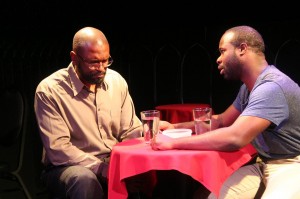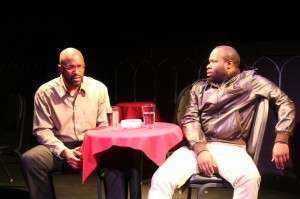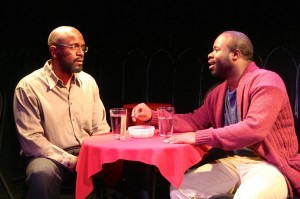
“How many of these things are there?” asks Salter (Lindsay Smiling), an aging father. He’s talking to his son, Bernard (B2) (Akeem Davis), who has recently discovered that he is one of ten or twenty clones.
Seeing or reading an unfamiliar play by Caryl Churchill is always a surprise. The luminary of 1970s British theater (Cloud 9, Owners) is never predictable, or only predictably unpredictable. In A NUMBER, her short engrossing work featured in this week’s A Play, A Pie, and A Pint, each genetically identical clone is as unique as a Churchill play.

Bernard 1 is an angry, maladjusted young man, abandoned by Salter after his mother’s death. Bernard 2 enjoyed a loving relationship with Salter, and turned out sweet and uncertain. Another clone, raised by a different family, is a bland schoolteacher. Davis switches between the three with subtle clothing changes and a mastery of countenance and demeanor.
Churchill raises questions about individuality in society, the ethics of cloning, and nature vs nurture, but this is no didactic political piece. Staged on a simple one-table set, A NUMBER contains quiet but startling and personal drama. Under Rebecca Wright’s direction, Smiling’s Salter is a father riddled with guilt and longing—it’s as if he yearns for a son he never had, despite having the same son twenty times. The Bernards struggle to to understand his decisions and the nature of being someone’s son.K

It’s natural to wonder how we might have turned out if our life had gone differently, if we’d been raised by different parents or in a different place. A NUMBER reveals that knowing that might not tell us anything new about ourselves. [Red Room at the Society Hill Playhouse, 507 S. 8th Street] October 9-12, 2014; tinydynamite.org.
